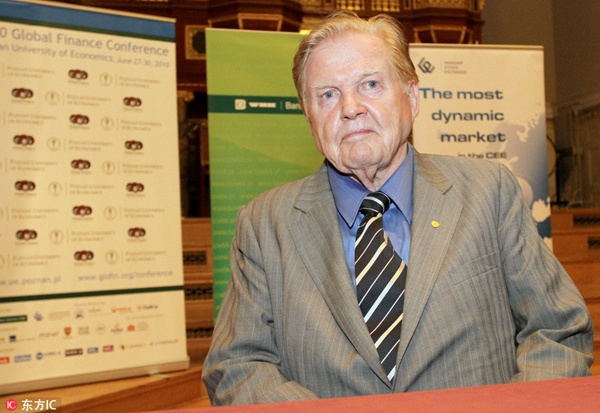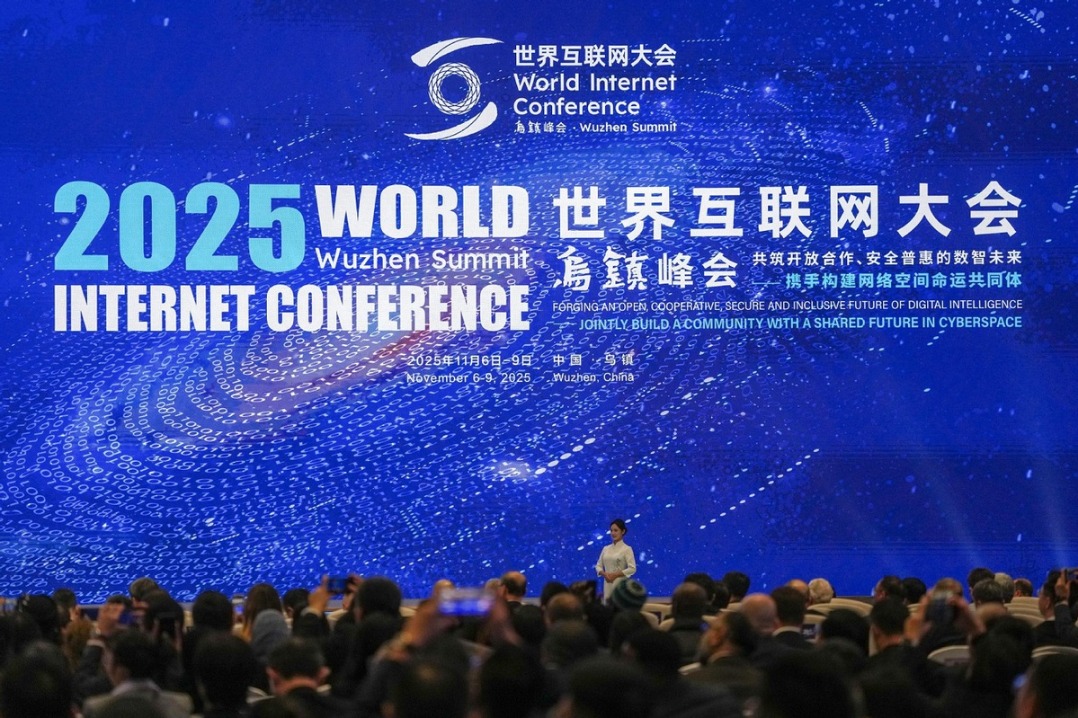Hailing an intellectual giant called Mundell


Robert Alexander Mundell, who died on April 4, was not only a Nobel Prize winner in economics, but also a distinguished professor-at-large at The Chinese University of Hong Kong since 2009, an honored colleague and an intellectual giant.
He was responsible for many innovative and original ideas in the fields of economics and international finance. His work on "optimum currency areas" and the "Mundell-Fleming Model" were path-breaking. For me personally, Mundell was a great friend and teacher.
He used to visit China very often to offer advice and expertise to the State leaders. He was the holder of a Chinese "green card" (a "permanent resident" card), and a university in Beijing, the Mundell International University for Entrepreneurship, has been named in his honor.
I remember the times we spent together at various conferences and forums on the Chinese mainland and in the Hong Kong Special Administrative Region. I particularly treasure the annual Santa Colomba Conferences, which Mundell and his wife, Valerie, hosted in a magnificent castle near Siena.
Mundell is known as the "Father of the Euro", the common currency used by 19 European Union member states. The common currency is the result of his work on optimum currency areas. (Can we imagine a United States today with 50 different currencies, one for each state? Interstate commerce would ground to a halt.)
The EU has clearly benefited from the introduction of the euro. Enterprises in the eurozone have been able to consolidate and achieve both efficiency and scale. Intra-eurozone trade rose significantly after the introduction of the euro. Foreign tourists to the EU, too, have benefited from the convenience of not having to keep exchanging currencies from country to country. It has also greatly benefited Europeans, for they can now trade without having to worry about the fluctuations of their relative exchange rates.
Among Mundell's influential works is the concept of the "Impossible Trinity", according to which it is impossible for an economy to have the following at the same time: a fixed exchange rate for its currency, free cross-border (and cross-currency) flows of capital (no capital controls), and an independent monetary policy (meaning an independent interest rate). At most, an economy can have two of the three at any one time.
The logic of the "Impossible Trinity" is impeccable. For example, China, for long, has had a more or less fixed exchange rate with the US dollar, and a monetary policy independent of the interest rate set by the US Federal Reserve, but it exercises capital control.
However, during my discussions with Mundell, we recognized that with the imposition of a Tobin tax (named after James Tobin, another Nobel Prize winner in economics) on both cross-border capital inflows and outflows, of say 1 percent, an economy can have a range for an independent interest rate differential with the rest of the world of up to 2 percent, while maintaining simultaneously a fixed exchange rate, free (albeit taxed) cross-border capital inflows and outflows, and an independent monetary policy.
This is because for foreign investors, unless the gross interest rate differential between a particular economy and the rest of the world is greater than 2 percent, they would have no interest in engaging in interest rate arbitrage, as any additional interest earned will be insufficient to cover the 1 percent taxes on both entry and exit.
Another important and potentially productive original idea developed by Mundell is "Incentive-Compatible Exchange-Rate Coordination". Almost all exporters, importers and foreign direct investors prefer relative stability of the exchange rates to wild volatility, which is beneficial to everyone if short-term fluctuations in the relative exchange rates can be contained within a reasonable range.
The United States should not want to see the euro devalued too much relative to the US dollar, because it would hurt US exports not only to the eurozone but also to third-party markets (for example, Airbus aircraft would become cheaper than Boeing planes). Similarly, the eurozone would not want to see the dollar devalued too much relative to the euro. What Mundell had in mind is that the US and the eurozone would agree on an acceptable range of fluctuations for the euro-dollar exchange rate.
When the devaluation of the euro hits the limit of the agreed range (that is, when the number of euros per dollar reaches a new high), the US would purchase euros with dollars, thus decreasing the number of euros per dollar and preventing the euro-dollar exchange rate from rising further.
Likewise, when the euro's appreciation hits the other limit of the range (that is, when the number of euros per dollar falls to a new low), the eurozone will sell euros for dollars, thus increasing the number of euros per dollar and preventing the euro-dollar exchange rate from falling further.
The proposed arrangement is "incentive-compatible" because the US intervenes when the euro devalues too much relative to the dollar, so as to help its exporters, and to maintain its GDP and employment. In the same way, the EU would intervene when the euro appreciates too much relative to the dollar, in order to help its exporters. Both sides have the incentive to act at precisely the right moment.
Mundell proposed this coordination arrangement initially between the dollar and the euro. The US dollar and euro between them account for more than 80 percent of cross-border clearings and settlements in the world. Such an arrangement would cement the dominance of the combined dollar-euro in global settlements.
However, the same arrangement could also be used between the dollar and the renminbi, benefiting both China and the US. The losers will be the commercial banks, which specialize in currency exchanges and speculation.
Mundell's many innovative and original ideas have resulted in important practical and useful applications. We shall all miss him.
The author is Ralph and Claire Landau professor of economics at The Chinese University of Hong Kong. The views don't necessarily reflect those of China Daily.
If you have a specific expertise and would like to contribute to China Daily, please contact us at opinion@chinadaily.com.cn, and comment@chinadaily.com.cn.

































